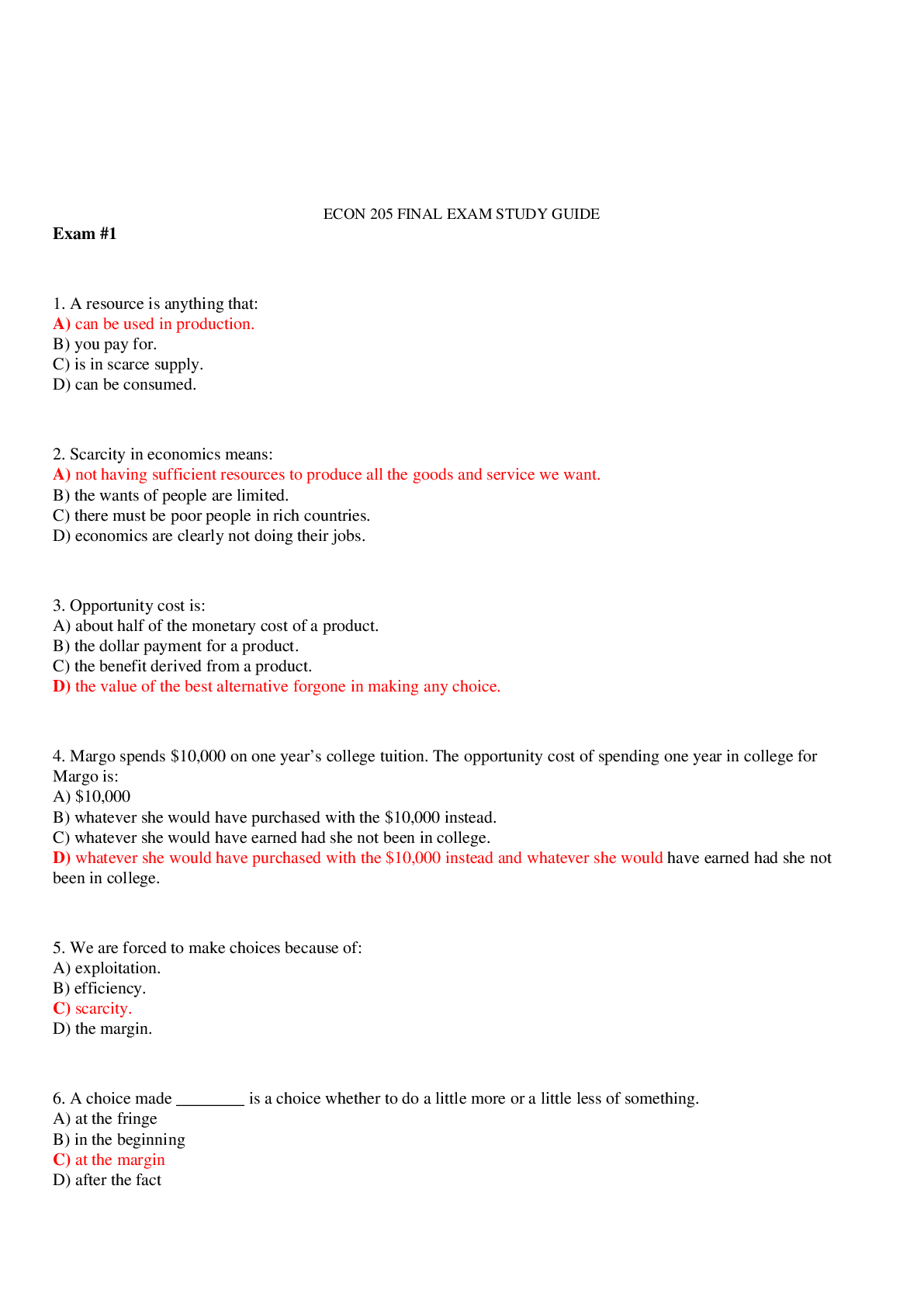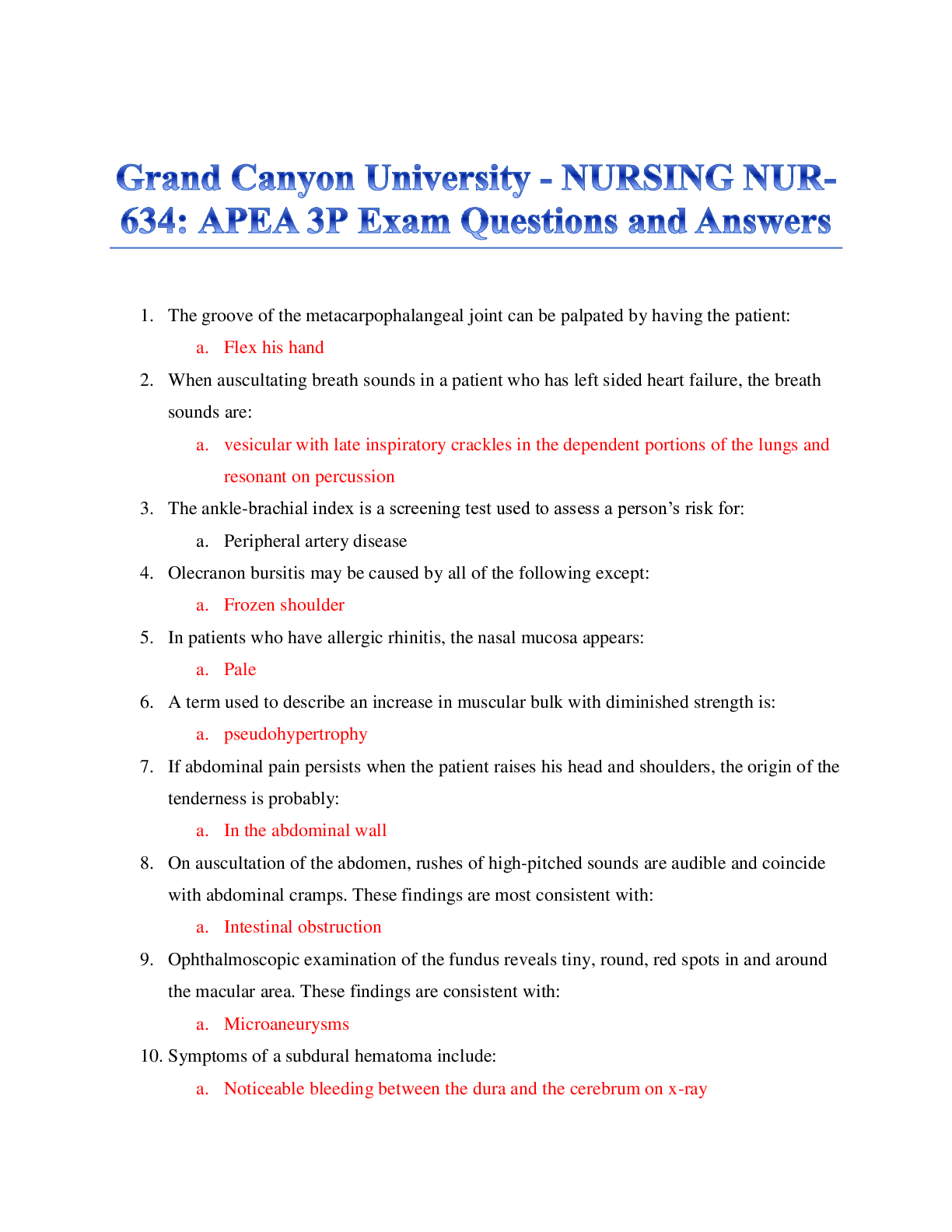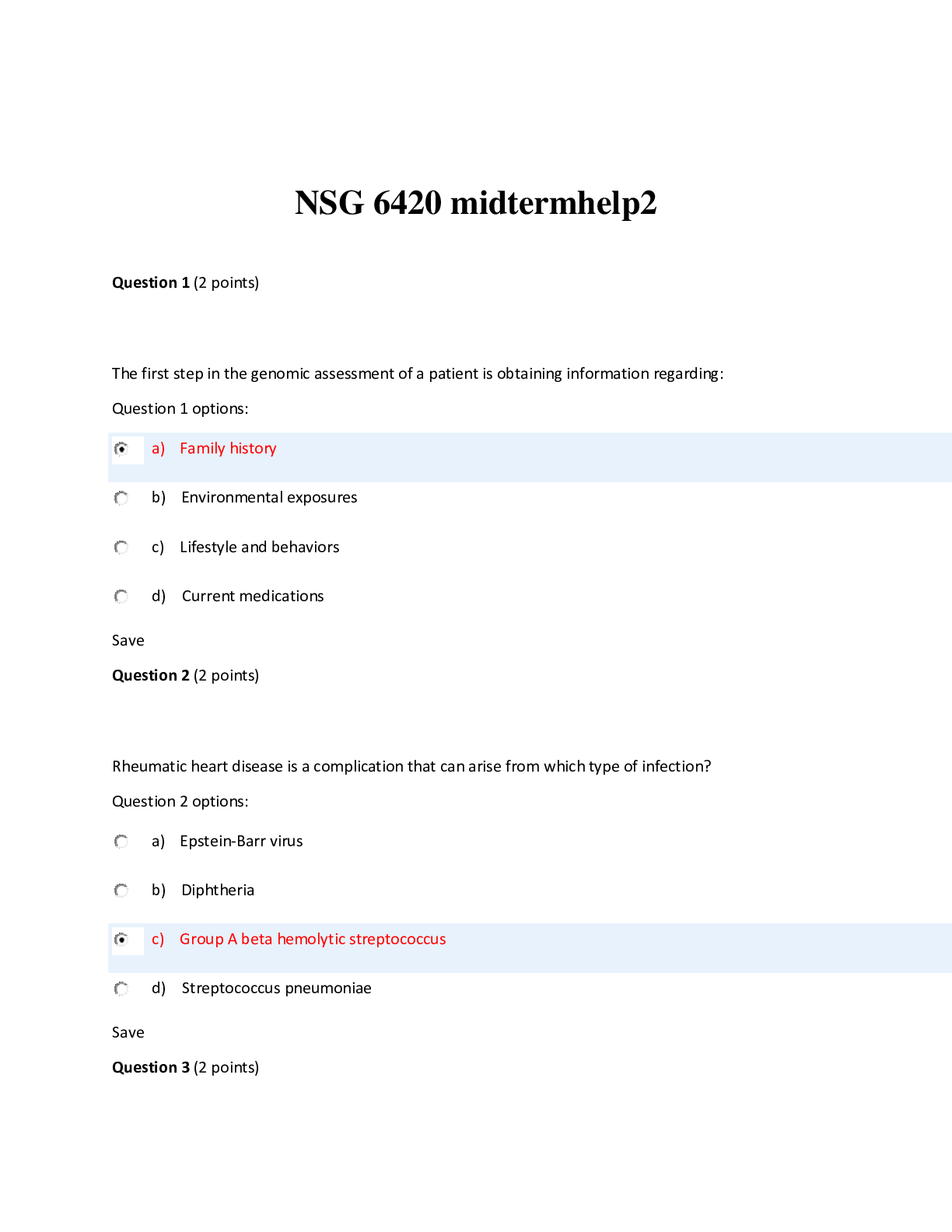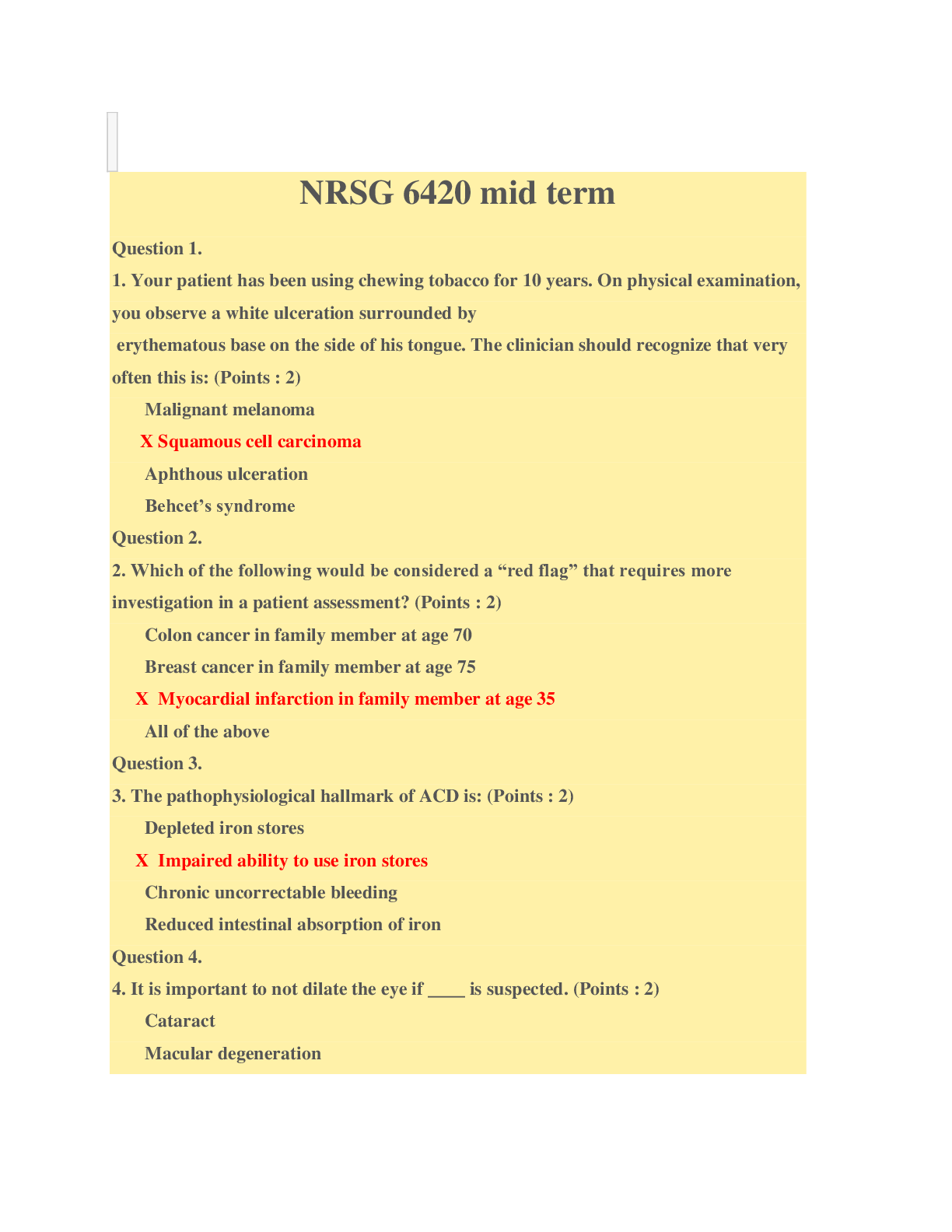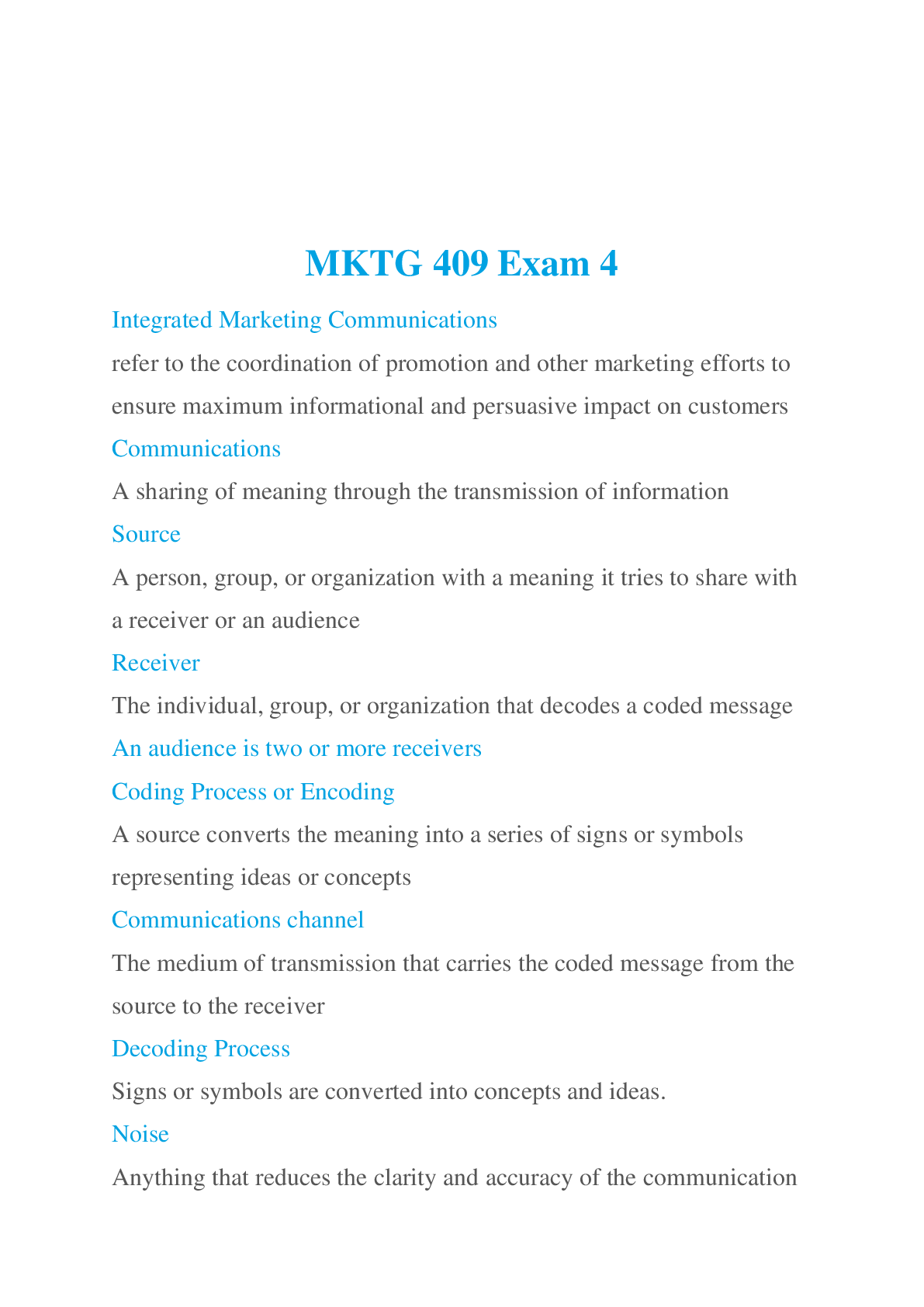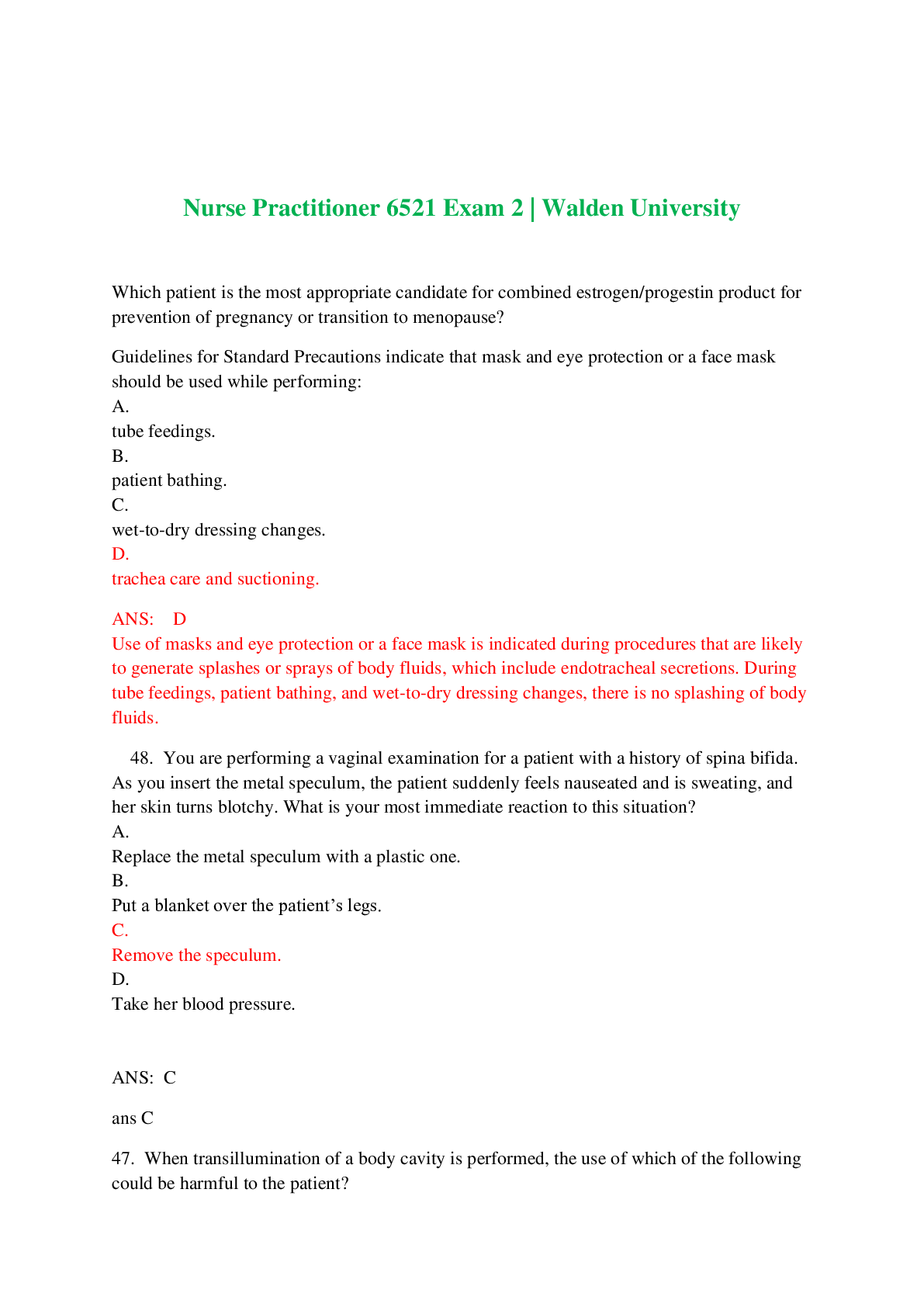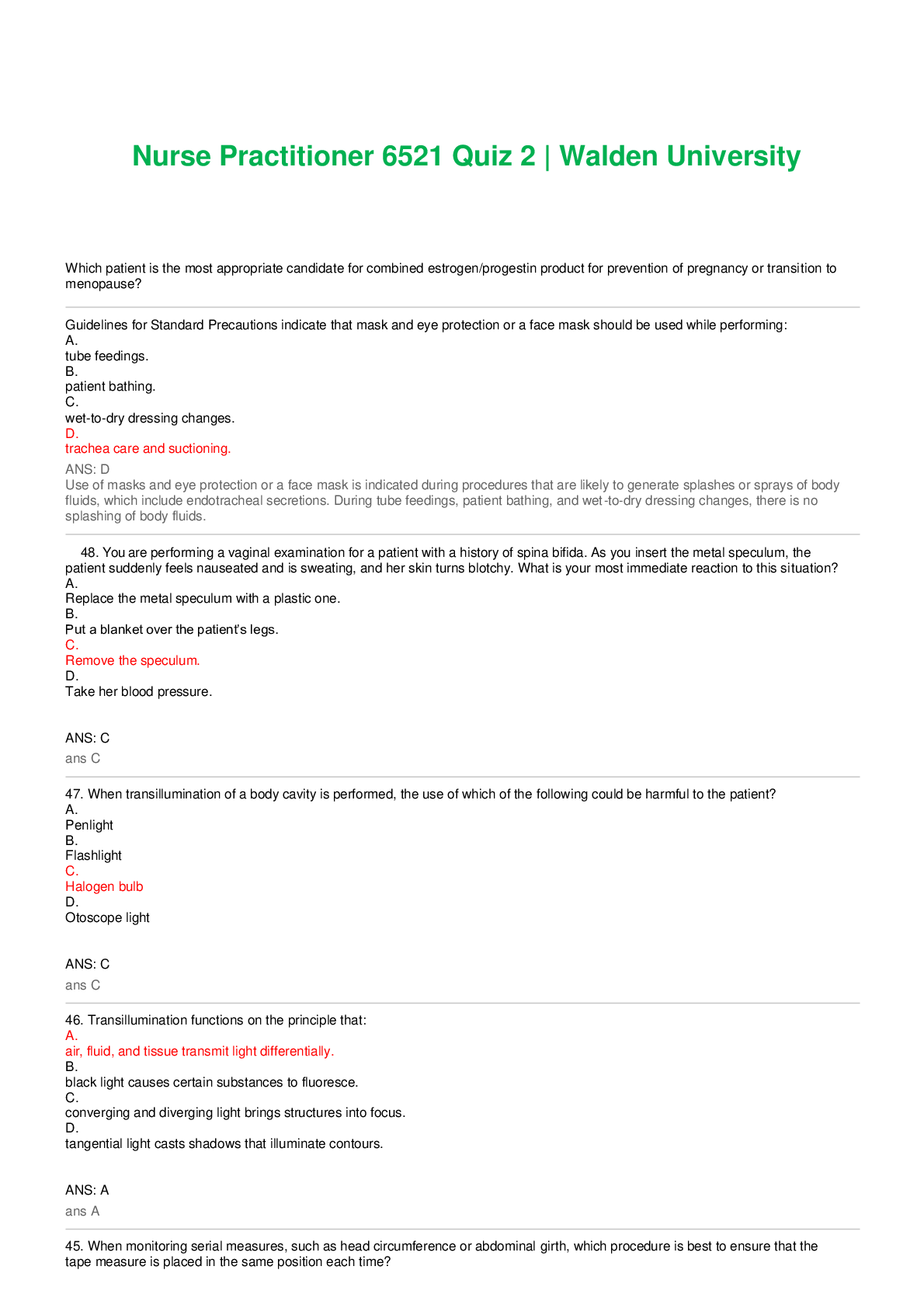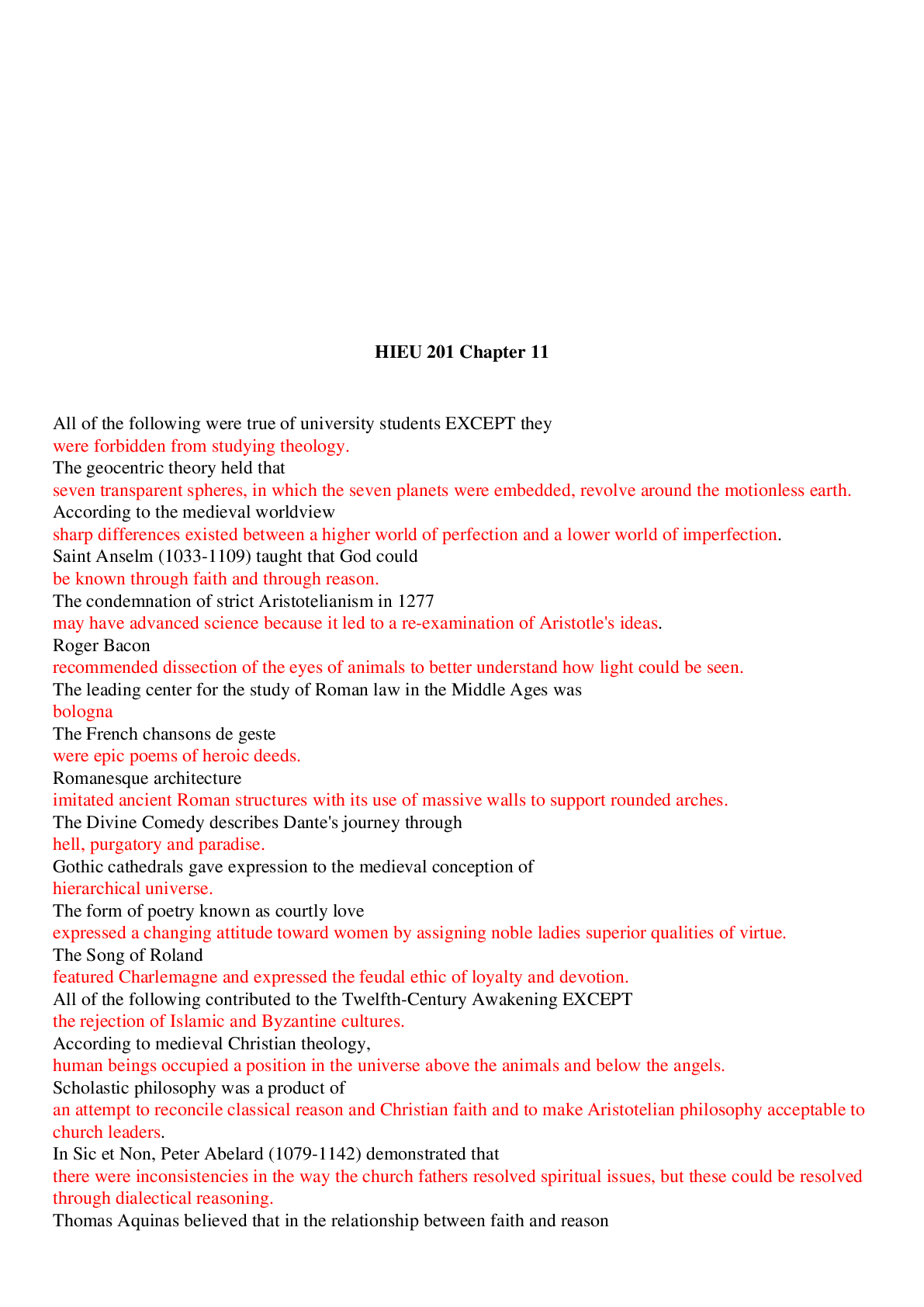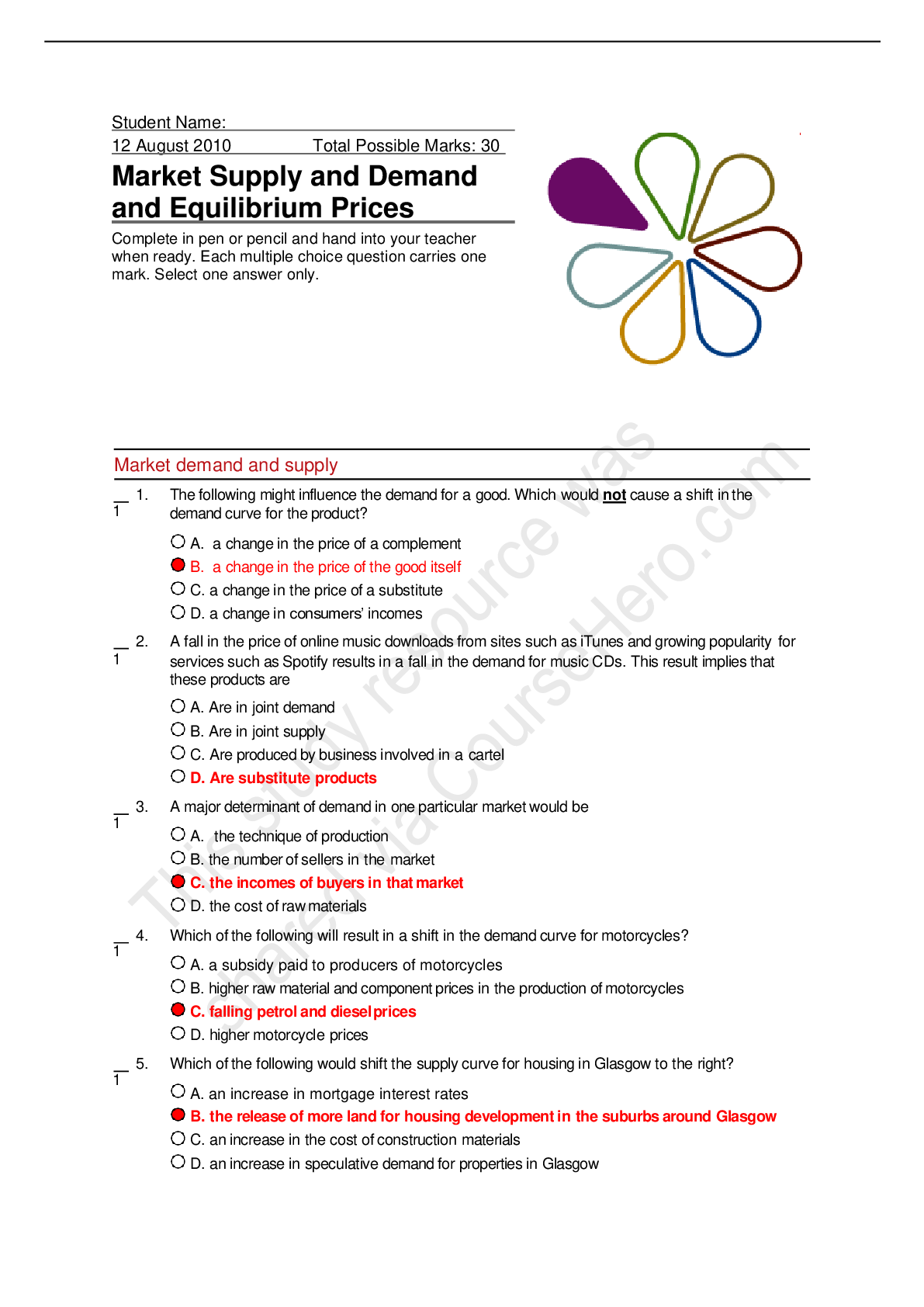NRSG 2510 Exam 4. All Answers Explained/Rationale.
Document Content and Description Below
NRSG 2510 Exam 4 1. A patient scheduled for an elective hysterectomy tells the nurse, “I am afraid that I will die in surgery like my mother did!” Which response by the nurse is most appropriate? ... a. “Tell me more about what happened to your mother.” b. “You will receive medications to reduce your anxiety.” c. “You should talk to the doctor again about the surgery.” d. “Surgical techniques have improved a lot in recent years.” 2. A patient arrives at the ambulatory surgery center for a scheduled laparoscopy procedure in outpatient surgery. Which information is of most concern to the nurse? a. The patient is planning to drive home after surgery. b. The patient had a sip of water 4 hours before arriving. c. The patient’s insurance does not cover outpatient surgery. d. The patient has not had surgery using general anesthesia before. 3. A patient who has never had any prior surgeries tells the nurse doing the preoperative assessment about an allergy to bananas and avocados. Which action is most important for the nurse to take? a. Notify the dietitian about the food allergies. b. Alert the surgery center about a possible latex allergy. c. Reassure the patient that all allergies are noted on the medical record. d. Ask whether the patient uses antihistamines to reduce allergic reactions. 4. During the preoperative assessment of a patient scheduled for a colon resection, the patient tells the nurse about using St. John’s wort to prevent depression. The nurse should alert the staff in the post anesthesia recovery area that the patient may a. experience increased pain. b. have hypertensive episodes. c. take longer to recover from the anesthesia. d. have more postoperative bleeding than expected. 5. On the day of surgery, the nurse is admitting a patient with a history of cigarette smoking. Which action is most important at this time? a. Auscultate for adventitious breath sounds. b. Ask whether the patient has smoked recently. c. Remind the patient about harmful effects of smoking. d. Calculate the cigarette smoking history in pack-years. 6. Before the administration of preoperative medications, the nurse is preparing to witness the patient signing the operative consent form when the patient says, "I do not really understand what the doctor said." Which action is best for the nurse to take? a. Provide an explanation of the planned surgical procedure. b. Notify the surgeon that the informed consent process is not complete. c. Administer the prescribed preoperative antibiotics and withhold any ordered sedative medications. d. Notify the operating room staff that the surgeon needs to give a more complete explanation of the procedure. 7. A diabetic patient who uses insulin to control blood glucose has been NPO since midnight before having a mastectomy. The nurse will anticipate the need to a. withhold the usual scheduled insulin dose because the patient is NPO. b. obtain a blood glucose measurement before any insulin administration. c. give the patient the usual insulin dose because stress will increase the blood glucose. d. administer a lower dose of insulin because there will be no oral intake before surgery. 8. When the nurse interviews a patient who is to have outpatient surgery using a general anesthetic, which information is most important to communicate to the surgeon and anesthesiologist before surgery? a. The patient drinks 3 or 4 cups of coffee every morning before going to work. b. The patient takes a baby aspirin daily but stopped taking aspirin 10 days ago. c. The patient drank 4 ounces of apple juice 3 hours before coming to the hospital. d. The patient’s father died after receiving general anesthesia for abdominal surgery. 9. The nurse is concerned about a postoperative patient’s risk for injury during an episode of delirium. The most appropriate action by the nurse is to a. secure the patient in bed using a soft chest restraint. b. ask the health care provider to order an antipsychotic drug. c. instruct family members to remain with the patient and prevent injury. d. assign unlicensed assistive personnel (UAP) to stay with the patient and offer reorientation. 10. A 68-year-old patient is diagnosed with moderate dementia after multiple strokes. During assessment of the patient, the nurse would expect to find a. excessive nighttime sleepiness. b. difficulty eating and swallowing. c. loss of recent and long-term memory. d. fluctuating ability to perform simple tasks. 11. Which action will help the nurse determine whether a new patient’s confusion is caused by dementia or delirium? a. Administer the Mini-Mental Status Exam. b. Use the Confusion Assessment Method tool. c. Determine whether there is a family history of dementia. d. Obtain a list of the medications that the patient usually takes. 12. A 72-year-old female patient is brought to the clinic by the patient’s spouse, who reports that she is unable to solve common problems around the house. To obtain information about the patient’s current mental status, which question should the nurse ask the patient? a. “Are you sad?” b. “How is your self-image?” c. “Where were you were born?” d. “What did you eat for breakfast?” 13. Which nursing action will be most effective in ensuring daily medication compliance for a patient with mild dementia? a. Setting the medications up monthly in a medication box b. Having the patient’s family member administer the medication c. Posting reminders to take the medications in the patient’s house d. Calling the patient weekly with a reminder to take the medication 14. A patient who has severe Alzheimer’s disease (AD) is being admitted to the hospital for surgery. Which intervention will the nurse include in the plan of care? a. Encourage the patient to discuss events from the past. b. Maintain a consistent daily routine for the patient’s care. c. Reorient the patient to the date and time every 2 to 3 hours. d. Provide the patient with current newspapers and magazines. 15. The nurse’s initial action for a patient with moderate dementia who develops increased restlessness and agitation should be to a. reorient the patient to time, place, and person. b. administer a PRN dose of lorazepam (Ativan). c. assess for factors that might be causing discomfort. d. assign unlicensed assistive personnel (UAP) to stay in the patient’s room. 16. Which hospitalized patient will the nurse assign to the room closest to the nurses’ station? a. Patient with Alzheimer’s disease who has long-term memory deficit b. Patient with vascular dementia who takes medications for depression c. Patient with new-onset confusion, restlessness, and irritability after surgery d. Patient with dementia who has an abnormal Mini-Mental State Examination 17. After change-of-shift report on the Alzheimer’s disease/dementia unit, which patient will the nurse assess first? a. Patient who has not had a bowel movement for 5 days b. Patient who has a stage II pressure ulcer on the coccyx c. Patient who is refusing to take the prescribed medications d. Patient who developed a new cough after eating breakfast 18. What feelings are most commonly experienced by nurses working with abusive families? a. Outrage toward the victim and discouragement regarding the abuser b. Helplessness regarding the victim and anger toward the abuser c. Unconcern for the victim and dislike for the abuser d. Vulnerability for self and empathy with the abuser 19. What is a nurse’s legal responsibility if child abuse or neglect is suspected? a. Discuss the findings with the child’s parent and health care provider. b. Document the observation and suspicion in the medical record. c. Report the suspicion according to state regulations. d. Continue the assessment. 20. A young adult has recently had multiple absences from work. After each absence, this adult returned to work wearing dark glasses and long-sleeved shirts. During an interview with the occupational health nurse, this adult says, “My partner beat me, but it was because I did not do the laundry.” What is the nurse’s next action? a. Call the police. b. Call the adult protective agency. c. Arrange for hospitalization. d. Document injuries with a body map. 21. A patient tells the nurse, “My husband lost his job. He’s abusive only when he drinks too much. His family was like that when he was growing up. He always apologizes and regrets hurting me.” What risk factor was most predictive for the husband to become abusive? a. History of family violence b. Loss of employment c. Abuse of alcohol d. Poverty 22. An adult tells the nurse, “My partner abuses me when I make mistakes, but I always get an apology and a gift afterward. I’ve considered leaving but haven’t been able to bring myself to actually do it.” Which phase in the cycle of violence prevents this adult from leaving? a. Tension-building b. Acute battering c. Honeymoon d. Stabilization 23. A survivor of physical spousal abuse was treated in the emergency department for a broken wrist. This patient said, “I’ve considered leaving, but I made a vow and I must keep it no matter what happens.” Which outcome should be met before discharge? The patient will: a. facilitate counseling for the abuser. b. name two community resources for help. c. demonstrate insight into the abusive relationship. d. reexamine cultural beliefs about marital commitment. 24. An older adult with Alzheimer’s disease lives with family in a rural area. During the week, the person attends a day care center while the family is at work. In the evenings, members of the family provide care. Which factor makes this patient most vulnerable to abuse? a. Multiple caregivers b. Alzheimer’s disease c. Living in a rural area d. Being part of a busy family 25. A parent asks the nurse why a developmental assessment is being conducted for a child during a routine well-child visit. The nurse answers based on the knowledge that routine developmental assessments during well-child visits are a. Not necessary unless the parents request them b. The best method for early detection of cognitive disorders c. Frightening to parents and children and should be avoided d. Valuable in measuring intelligence in children 26. The father of a child recently diagnosed with developmental delay is very rude and hostile toward the nurses. This father was cooperative during the child’s evaluation a month ago. What is the best explanation for this change in parental behavior? a. The father is exhibiting symptoms of a psychiatric illness. b. The father may be abusing the child. c. The father is resentful of the time he is missing from work for this appointment. d. The father is experiencing a symptom of grief. 27. The best setting for daytime care for a 5-year-old autistic child whose mother works is a. Private day care b. Public school c. His own home with a sitter d. A specialized program that facilitates interaction by use of behavioral methods 28. 20. Parents have learned that their 6-year-old child has autism. The nurse may help the parents to cope by explaining that the child may a. Have an extremely developed skill in a particular area b. Outgrow the condition by early adulthood c. Have average social skills d. Have age-appropriate language skills 29. A child with autism hospitalized with asthma. The nurse should plan care so that the a. Parents’ expectations are met. b. Child’s routine habits and preferences are maintained. c. Child is supported through the autistic crisis. d. Parents need not be at the hospital. 30. An older patient with dementia and confusion is admitted to the nursing unit after hip replacement surgery. Which action will the nurse include in the plan of care? a. Keep a routine. b. Continue to reorient. c. Allow several choices. d. Socially isolate patient. [Show More]
Last updated: 8 months ago
Preview 1 out of 13 pages

Buy this document to get the full access instantly
Instant Download Access after purchase
Buy NowInstant download
We Accept:

Reviews( 0 )
$9.00
Can't find what you want? Try our AI powered Search
Document information
Connected school, study & course
About the document
Uploaded On
Oct 09, 2020
Number of pages
13
Written in
All
Additional information
This document has been written for:
Uploaded
Oct 09, 2020
Downloads
0
Views
131














